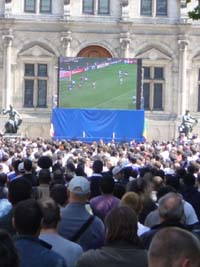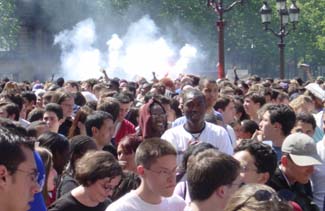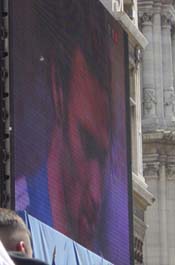|
It is an incongruous
image, a Jumbotron set up in front of the Hotel de
Ville, the city hall of Paris since 1533. Between 3,000
and 5,000 people overflow from the square into the street,
even onto the bridge that leads to Notre Dame down the
street. All are there to watch the opening French soccer
match taking place way over in Asia, where the French
team is playing Senegal.
Walking over to Place de
l’Hotel de Ville, I had expected to see a hundred
or so people that would come and go, much like at the
modest, summer afternoon concerts in downtown Chicago
with their lunchbreak visitors. Instead there was a swelling
mass of people, tourists and citizens with standing room
only, splayed out in front of a Jumbotron that was nowhere
near jumbo enough. Of course, this could be my Americanness
talking, which gives me the impression that we should
do everything on a large scale and sit too close to the
TV. Placing a television screen in a large public space
in the city seemed a practical way to keep tabs on the
game in the middle of one's day, not to mention one of
the generous social services the French nation is known
for.
 |
Like it does for many Americans,
soccer bores me. Though I played it happily in my youth,
I lost interest in high school. Why did this happen for
me and so many others? While professional soccer exists
in the United States, it suffers from a miniscule, though
committed, fanbase. This seems more than a bit ironic
considering that soccer is such a strong part of the elementary
and high school sports curriculum. In contrast, while
football is the most popular and well-attended high school
sport, it isn’t played in gym class in its full glory.
Yet football has thrived professionally as one of the
big three spectator sports in the United States, even
though most men have never played it themselves as it
is played on the professional field. Soccer, on the other
hand, seems to be in its nature a participatory
rather than a spectator sport, at least in the
United States.
Though I find watching
baseball a bit boring, it does not compare to the tedium
of watching soccer, on a field that I’m not the first
to opine is just too damn big. Back in 1998 during the
last World Cup, New Yorker staff writer Adam Gopnik
was living in Paris. In an attempt to understand why soccer
is so well loved the world over, compared to the lack
of interest in the United States, Gopnik forced himself
to watch a month’s worth of matches. He eventually
came around, either due to a form of Helsinki syndrome
or an honest epiphany of how soccer relates to life. "We
seek unfair advantage, celebrate tiny moments of pleasure
as though they were final victories, score goals for the
wrong side," wrote Gopnik. "The World Cup is a festival
of fate: man accepting his hard circumstances, the near
certainty of his failure."
Add to this the geopolitical
issues, and hell, it's quite a thing, the World Cup is.
A former colony of France, Senegal is competing for the
first time in the World Cup. As the formerly colonized
takes the field against the former colonizer, immediately
the potential for hubris comes out to play, in a way that
doesn’t when sports teams from, say, Indianapolis
and Cleveland face each other. Unlike our rather puffed-up
notions of a "World" series in baseball, the
World Cup is actually global. What's more, the World Cup
feels less like the Olympics in general and more like
the 1980 U.S.A vs. U.S.S.R. hockey match, with that kind
of potential international drama. In other words, it isn’t
politics, but it is political. In England, church times
were changed this past Sunday so as to not create a conflict
for soccer fans. There were even Jumbotrons erected on
church grounds. In the Middle East, Arabs and Jews put
aside conflicts for a bit to watch the matches together,
reports an article on MSNBC’s site. With World Cup
fever, one gets the sense that the geopolitical events
of the day are just a nuisance, that the conflicts of
nations should have a time-out for the sake of world sports.
Like a marriage that stays together for the spectacular
anniversary parties, the World Cup demands it.
 |
It is still something I
am not accustomed to, how sports news headlines outside
the United States read like political science book spines,
grandiose declarations of nation-states and their battles.
Mexico vs. Croatia, Brazil vs. Turkey. It is epic, grand,
much like the field itself; slow-going, like international
diplomacy.
In 1998, Jean-Marie Le
Pen commented on the French players, with their diversity
of color and origin, for not singing the national anthem
with enough feeling. For most others, the team was a symbol
of French diversity and unity, particularly when it went
on to win the World Cup. And now here they are again,
four years later, still having Le Pen to kick around (despite
his defeat in the presidential election, his National
Front party is up for more than a few legislative seats
in the election this month), an even more multi-ethnic
team, in a Europe becoming more conservative about immigration
and what it means to belong to a nation. The main star
of the team, probably the most famous face in France these
days, is Zinedine Zidane. His Algerian parents came to
Marseille, where Zidane was born, much like many immigrant
families in the wake of decolonialization and war. He
led France to victory in the 1998 World Cup, and though
injured at the moment is the anchor for this team of defending
champions. He is also as ubiquitous as Michael Jordan,
selling phone services, water and more. And also like
Jordan, he is a symbol. As national hero #1 amongst not
just the large North African population but the white
French kids, he represents a victory for cultural identity
and also transcends it. Pop culture heroism trumps prejudice
every time.
***
 |
The crowd in Place de l’Hotel
de Ville roars as if the match is happening in front of
us. There are vendors for food and sundries, along with
TV cameramen documenting the festivities that are undoubtedly
taking place all over the world, but particularly in France
and specifically in Paris, where they still talk about
the celebrations in 1998. I spend more time watching the
crowd than the match, finding the energy thrilling, hearing
a shockingly loud collective roar each time that hope
rises, reacting to a two-dimensional wall, the fantasy-fix
of every off-track betting junkie. There is also something
significant to large peaceful crowds gathering, unchecked
by any security point, not for political protest or to
strike, but just to watch some guys kick a ball around.
Ah, but then France cannot score a goal, and the competition
comes down to just that: Senegal: 1, France: O. People
begin to walk away quickly, back to the rest of the day,
as the Jumbotron waits for the crowds to return for the
next match.
|